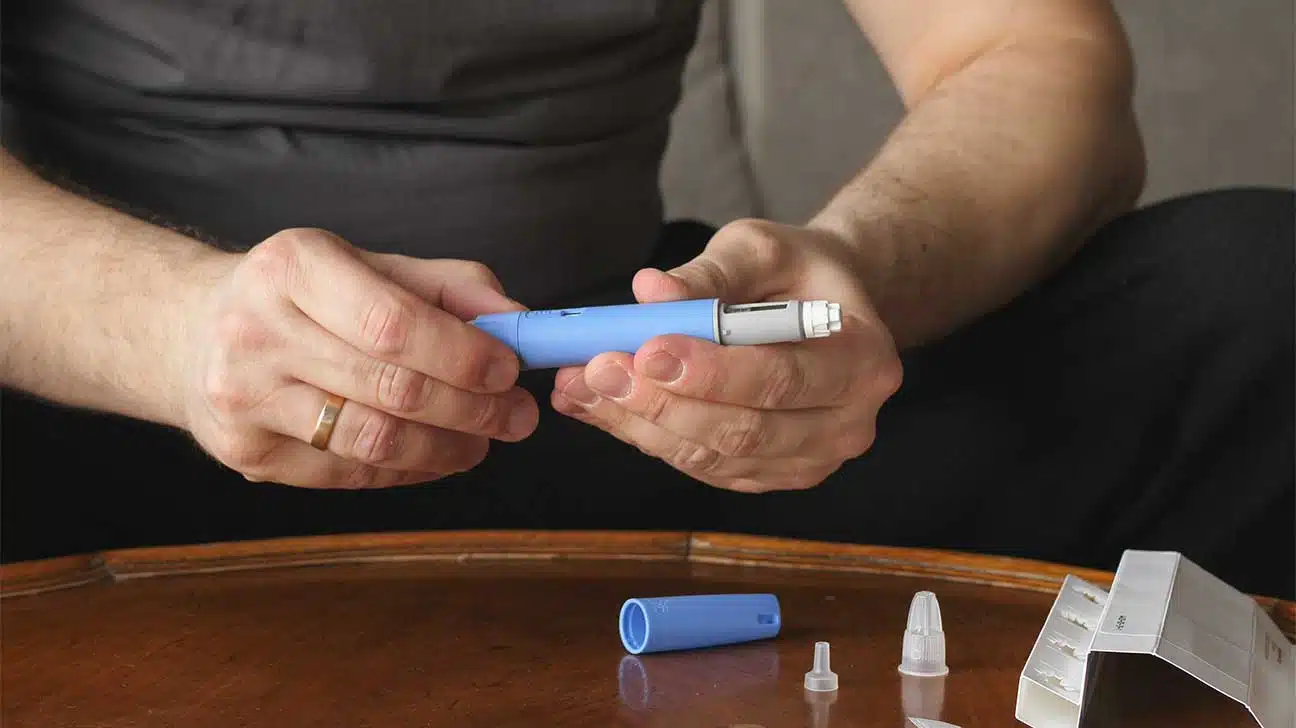
Ozempic, the brand name for semaglutide, has been regularly used throughout the medical community since it was first approved in 2017.
Although it’s a newer prescription medication, it’s already one of the most commonly prescribed drugs in the United States, with several million people taking it each year.
Celebrities and medical practitioners have been endorsing Ozempic as a weight-loss drug, but that was not its original intended use. It’s now sparking further interest as a substance abuse treatment.
What Is Ozempic?
Ozempic, first created as a Type 2 diabetes drug, is a glucagon-like peptide (GLP) receptor agonist with U.S. Food and Drug Administration (FDA) approval as a medicine for glycemic control and cardiovascular health.
Shortly after debuting on the medical market, Ozempic began to be hailed as an effective weight-loss medication for people experiencing obesity or uncontrollable weight gain.
Weight loss is Ozempic’s most common off-label use, and people who take the drug for this use report that it has noticeably curbed their appetite.
As more people began taking Ozempic, healthcare workers noticed an increase in reports of patients consuming not only less food but also less alcohol and nicotine and even engaging less frequently in behavioral addictions like compulsive shopping.
Ozempic As A Substance Abuse Treatment
Recent client testimonials are documenting curbed addictive behaviors after taking Ozempic, but what does it mean for the future of semaglutide as a treatment for substance abuse?
Although there are no clinical trials on humans being done, researchers have begun looking at how Ozempic affects mice induced with alcohol use disorder.
A recent study in the Journal of Clinical Investigation found that semaglutide lowered the amount of alcohol the mice consumed at similar rates to human clients who ate less after taking Ozempic.
More evidence is showing that GLP-1 receptors are involved in the neurobiology of addiction, and GLP agonists directly influence the brain’s dopamine reward center to reduce cravings.
Further testing is necessary to confirm these studies, but many researchers are speaking positively about the future of semaglutide as a substance abuse medication.
Does Ozempic Have Potential As A Depression Treatment?
In addition to studies being conducted on the potential use of Ozempic for addiction treatment, researchers are also looking into it as a depression treatment.
There is currently a small study underway in Toronto to determine this potential. If this application is effective, it may be one of the first dual diagnosis treatment medications on the market.
Additional studies are being done to test semaglutide’s efficacy in treating Alzheimer’s disease, cancer, strokes, heart disease, and liver disease.
Potential Risks And Side Effects
Like any other medication, Ozempic comes with some potential risk factors and side effects that range from mildly unpleasant to harmful.
If you experience any of these while taking Ozempic, contact your health care provider right away.
Common side effects of Ozempic include:
- nausea
- diarrhea
- stomach pain
- constipation
- vomiting
Rarer side effects include:
- changes in vision
- low blood sugar or blood pressure
- kidney problems
- gallbladder problems
- pancreatitis
Although the potential of Ozempic for addiction treatment seems promising, it is not yet approved for this use. It’s important only to take Ozempic as prescribed by a healthcare professional.
Addiction Treatment Options Similar To Ozempic
Medication-assisted treatment (MAT) is not a new form of treatment in drug and alcohol rehab programs. There are several effective pharmaceuticals on the market that help people in recovery.
These medicines are primarily used to help people recovering from alcohol or opioid abuse. There are not yet medications for treating addictions to stimulants, hallucinogens, cannabis, or similar substances.
MAT options include:
- buprenorphine
- naltrexone
- methadone
- disulfiram
- acamprosate
Acamprosate and disulfiram are used as treatments for alcohol addiction and work by causing negative reactions to drinking and reversing alcohol-induced brain changes.
Buprenorphine, naltrexone, and methadone are common opioid and opiate abuse treatments. They function by interacting with the brain’s opioid receptors to imitate and block the effects of stronger opioids like heroin or prescription painkillers.
These medications are generally considered safe and effective treatments, but they come with their own risks and side effects, particularly when misused.
Since there are only a few substance use disorders treated by existing MAT options, Ozempic has the potential to revolutionize addiction recovery methods.
Get Help For A Substance Use Disorder
If you or someone you love is battling drug addiction or alcohol abuse, you are not alone. Contact AddictionResource.net today to learn about your recovery options.
Addiction Resource aims to provide only the most current, accurate information in regards to addiction and addiction treatment, which means we only reference the most credible sources available.
These include peer-reviewed journals, government entities and academic institutions, and leaders in addiction healthcare and advocacy. Learn more about how we safeguard our content by viewing our editorial policy.
- Journal of Clinical Investigation
https://insight.jci.org/articles/view/170671 - National Library of Medicine
https://clinicaltrials.gov/ct2/show/NCT05520775 - Ozempic
https://www.ozempic.com/how-to-take/side-effects.html

